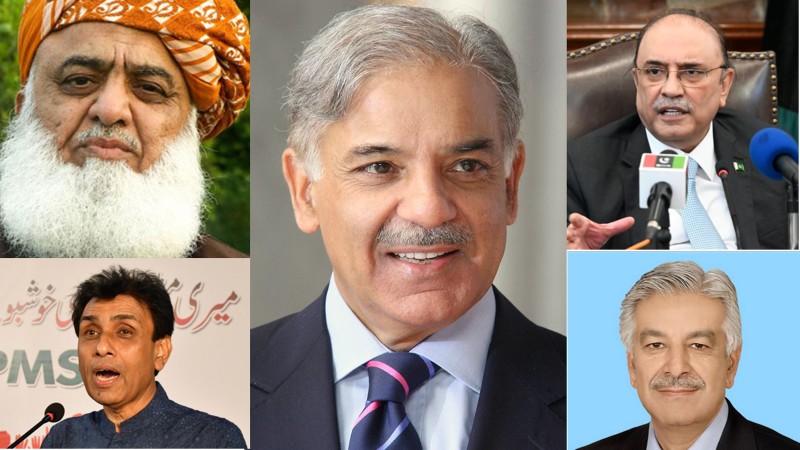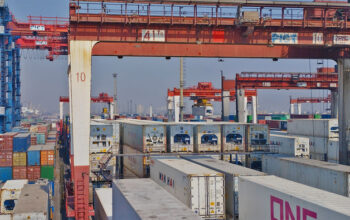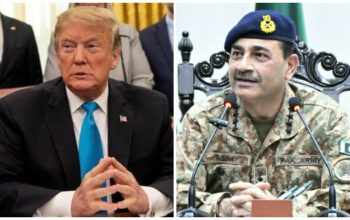“Keep calm and carry on” is the message emerging from the PDM meeting, in which PM Sharif received assurances of necessary support from his coalition partners
By Staff Reporter
ISLAMABAD: The Pakistan Democratic Front (PDM) government has decided to bite the bullet of economic stabilisation and aim to complete the full term of the sitting National Assembly before heading to the general election, well-placed sources told Independent Pakistan on Wednesday.
The decision surfaced at a high-level meeting of the coalition leadership, chaired by Prime Minister Shehbaz Sharif.
Among those in attendance were PDM president Maulana Fazlur Rehman, who heads his own Jamiat-e-Ulema-e-Islam (JUI) party; former President Asif Ali Zardari, who is also the co-chair of Pakistan Peoples Party (PPP); and Muttahida Qaumi Movement-Pakistan (MQM-P) convener Khalid Maqbool Siddiqui.
Also present at the meeting were several cabinet ministers and stalwarts of PM Sharif’s Pakistan Muslim League-Nawaz (PML-N) party including Khawaja Asif, Marriyum Aurangzeb, and Azam Nazeer Tarar.
Elected to the office after the ouster of former Prime Minister Imran Khan, PM Sharif assumed power with a view to completing the term of the incumbent national assembly. The matter had been settled even before his PDM coalition moved a vote of no confidence against Khan.
But a variety of factors complicated the situation soon after his assumption of power – and the coalition government found itself on the horns of a dilemma. It could take the cynic’s choice and call early polls, dodging the responsibility for the tough and unpopular decisions required to put the country’s gutted economy back on the rails; or it could aim for the full term and pay the political price.
The foremost factor contributing to this dilemma was the ousted Prime Minister Khan’s insistence on immediate polls. His hand was strengthened by the impression that some among the country’s military leaders backed this option. It did not help that some PDM leaders, including some of Sharif’s party colleagues, let slip remarks supporting this option on various occasions.
The impression of military’s support for early polls in the month of October in particular lent an air of credence to the conspiracy theory already percolating in political and media circles that PDM had been lured into power precisely to take the fall for the economic mess made by the Khan government.
The prime minister elected in October would arrive just in time to name Pakistan’s next Chief of Army Staff, with incumbent Qamar Javed Bajwa due to complete his term in November.
Another version of the theory said Zardari been in on the plot, aimed at hurting the electoral prospects of PML-N. The government was ostensibly in a paralysis of sorts and political uncertainty returned, taking its toll as the markets resumed their downward slide after the initial rally following Sharif’s rise to power.
It was against this backdrop that PM Sharif and his key aides travelled to London to confer with his elder brother and thrice prime minister of Pakistan Nawaz Sharif. Threadbare discussions spread over three days attended to all aspects of the situation.
Several sources say the elder Sharif advised the PM to ensure, before making any tough calls, that the national narrative put the blame for the mess where it rightfully belonged: The economy has been gutted after over four years of mismanagement and dereliction of duty under the watch of Khan, who was installed into power by Pakistan’s security establishment through underhanded means.
He also advised his younger brother to make sure all his coalition partners understood the implications of the requisite tough calls, and were prepared to share political ownership for those calls.
Some of Sharif’s cabinet colleagues held a presser in London before returning, talking tough as to how their leader had been wrongfully ousted from power through a misplaced judicial process; how he had been dragged through the courts and even put behind bars on flimsy, politically motivated charges; and how the economy had been left in shambles by the Khan and his coterie.
They said they had arrived at key decisions as to the way forward, but insisted those decisions would only be final once approved by their PDM partners. Accordingly, PM Sharif started consulting his PDM allies on Monday when he returned from London via Dubai, his consultations culminating in the Tuesday.
Sources privy to the proceedings of the meeting say the coalition partners assured PM Sharif of their support in the difficult task on hand, and urged him to take the requisite measures to stabilise the rupee and resume a stalled bailout program from the International Monetary Fund (IMF).
Almost directly after the meeting, a team of a Pakistani delegation led by Finance Minister Miftah Ismail left for Doha to hold scheduled talks with IMF staff as of Wednesday. The parleys are part of the seventh review of a USD 6-billion Extended Fund Facility (EFF) that has been on the rocks since Khan went back on an earlier commitment with the Fund to end a fuel subsidy.
While the Pakistani side will press for the resumption of the program, the IMF staff are expected to dig in to make the withdrawal of fuel subsidy a prior action for the completion of the review before resuming the program and releasing a USD 1-billion EFF tranche.
The abolition of the subsidy is likely to trigger a fresh flood of inflation, hitting hard the middle and lower-income strata of the society. Perhaps even more worrisome for the government would be the response of the rent-seeking upper strata, who will hate foregoing subsidised fuel for their SUVs and factories.
Apart from economy, the PDM meeting also discussed electoral reform, and all parties assured PM Sharif of their wholehearted support in the matter.
In the months ahead of his ouster, Khan’s Pakistan Tehreek-e-Insaf (PTI) had bulldozed a bunch of amendments to electoral laws that were seen with PDM leadership with great suspicion. The coalition had agreed ahead of the VONC to rollback those amendments before the next general election.
At the meeting, the PDM partners reaffirmed their commitment to the cause, and urged PM Sharif to press ahead with the requisite electoral reforms.
The meeting also deliberated on the Supreme Court of Pakistan decision to nullify the votes of any dissenting lawmakers as it interpreted the Article-63A of the Constitution related to the disqualification of the MNAs over floor-crossing.
It was decided that legal opinion on the decision of the top court would be sought before deciding on a plan of action in this regard.
Copyright © 2021 Independent Pakistan | All rights reserved




